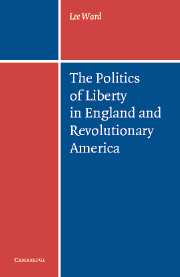Book contents
- Frontmatter
- Contents
- Acknowledgments
- Introduction: Reexamining the Roots of Anglo-American Political Thought
- PART ONE THE DIVINE RIGHT CHALLENGE TO NATURAL LIBERTY
- PART TWO THE WHIG POLITICS OF LIBERTY IN ENGLAND
- 4 James Tyrrell: The Voice of Moderate Whiggism
- 5 The Pufendorfian Moment: Moderate Whig Sovereignty Theory
- 6 Algernon Sidney and the Old Republicanisms
- 7 A New Republican England
- 8 Natural Rights in Locke's Two Treatises
- 9 Lockean Liberal Constitutionalism
- 10 The Glorious Revolution and the Catonic Response
- 11 Eighteenth-Century British Constitutionalism
- PART THREE THE WHIG LEGACY IN AMERICA
- Conclusion
- Bibliography
- Index
4 - James Tyrrell: The Voice of Moderate Whiggism
Published online by Cambridge University Press: 28 October 2009
- Frontmatter
- Contents
- Acknowledgments
- Introduction: Reexamining the Roots of Anglo-American Political Thought
- PART ONE THE DIVINE RIGHT CHALLENGE TO NATURAL LIBERTY
- PART TWO THE WHIG POLITICS OF LIBERTY IN ENGLAND
- 4 James Tyrrell: The Voice of Moderate Whiggism
- 5 The Pufendorfian Moment: Moderate Whig Sovereignty Theory
- 6 Algernon Sidney and the Old Republicanisms
- 7 A New Republican England
- 8 Natural Rights in Locke's Two Treatises
- 9 Lockean Liberal Constitutionalism
- 10 The Glorious Revolution and the Catonic Response
- 11 Eighteenth-Century British Constitutionalism
- PART THREE THE WHIG LEGACY IN AMERICA
- Conclusion
- Bibliography
- Index
Summary
The publication of James Tyrrell's Patriarcha, Non Monarcha in 1681 was the first major Whig shot fired in the polemical dispute raised by the issue of Exclusion. It was at once a piece d'occasion devoted to advancing the Whig position in the Exclusion crisis and a major work of political philosophy dealing with such issues as the nature of political society, the origin of property, the principle of consent, and the main features of late-seventeenth-century natural jurisprudence. One commentator has observed that Patriarcha, Non Monarcha is “perhaps the most interesting work of political theory published in England between 1660 and 1689.” At its core, this work is the classic moderate Whig defense of limited government against what Tyrrell calls Filmer's “Absolute Monarchy Jure Divino.” In contrast, Tyrrell presents himself as a defender of the rule of law and rejects all of Filmer's attempts to deny the validity of the legal limits on monarchical power that require rulers to abstain from the “Lives, Liberties or Properties of their Subjects.”
Tyrrell's moderate political credentials were impeccable. He was born in 1642 at the outbreak of England's turbulent civil war period. As the son of a prominent Buckinghamshire gentleman in royal service, Sir Timothy Tyrrell, and grandson on his maternal side of the celebrated champion of the divine right of kings, Archbishop Ussher of Armagh, James Tyrrell's familial political legacy was decidedly Cavalier.
- Type
- Chapter
- Information
- The Politics of Liberty in England and Revolutionary America , pp. 105 - 132Publisher: Cambridge University PressPrint publication year: 2004

